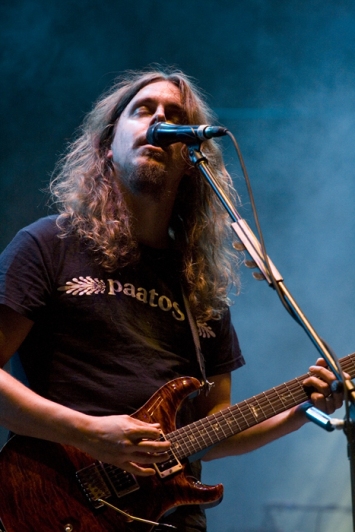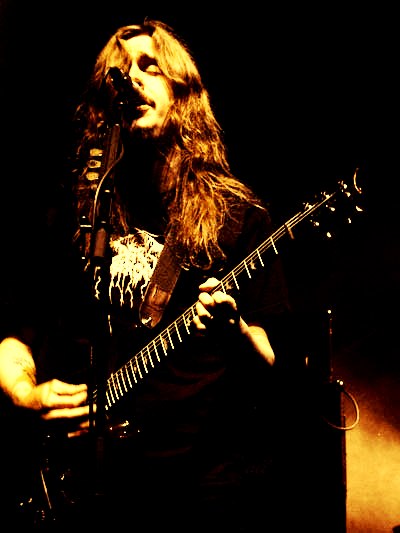In death metal, few musicians have been able to match up to the creativity and proficiency that Mikael Åkerfeldt brings to the genre. He has made a name for himself particularly with his main band Opeth which is recognized as an unorthodox, yet very influential death metal band.
-
Mikael was born in Sweden on the 17th of April 1974. When he was young he studied guitar in classical context, however during his teenage years he discovered bands like Led Zeppelin and Black Sabbath, so he decided to switch gears and move towards metal. This lead him to form Eruption, a short-lived death metal band that only lasted from 1988 until 1990. Later on, he was recruited by David Isberg to join Opeth as a bassist which caused all the other members to leave because they didn’t want him in the band. After two years, David left so Mikael decided to take over the vocal and guitar duties in the band. Later on, after several lineup changes, the band released it’s debut album titled Orchid through Candlelight records, the same label that released albums by artists like Emperor, Ihsahn, Zyklon and 1349. The album differed greatly from what was generally defined as death metal. Focusing less on speed and aggression, and employing clean and acoustic parts along with odd timings gave the band it’s unique progressive sound.
https://www.youtube.com/watch?v=w5LmbsVn9vA
-
Mikael’s vocal skills are highlighted by his ease in achieving flawless growls as well as his serenading clean voice; two skills which vocalists can rarely possess simultaneously. However Mikael proves to be an exception.
https://www.youtube.com/watch?v=wxaFANthouM
-
Mikael has been with Opeth ever since the beginning, regardless of all the lineup changes, and the band’s trademark sound hasn’t changed because Mikael is the one who leads the composition of the songs’ music and lyrics. Whether it’s Morningrise, Deliverance, Still Life, etc, all the albums maintain Opeth’s signature style while each one has some uniqueness to it. For example, Still Life and My Arms Your Hearse are both concept albums telling a story through the songs. Damnation is the smoothest album by the band which excludes growls, fast drumming, and heavy guitar parts.
-
Regardless of the success that Opeth had achieved, Mikael decided to form a death metal band with Dan Swanö on drums, Jonas Renkse on the bass and Anders Nyström on guitar. Unlike his position in Opeth, Mikael only sang in Bloodbath. The band released their first EP titled “Breeding Death” on Century media records in 2000, and later in 2002 released their full-length album “Resurrection Through Carnage”, which was the last album to feature Dan on the drums. After that, Opeth’s current drummer Martin “Axe” Axenrot and Dan took the second guitar spot.
The band’s sound differed dramatically from that of Opeth. Utilizing lower tunings, and focusing more on blast beats and speed, the band played pure death metal, with lyrical themes revolving around gore and carnage. Compared to Opeth, Bloodbath was faster, more aggressive, and heavier.
Mikael’s contributions to both bands shows his versatility and well-roundness as a vocalist, songwriter, and guitarist. His creativity makes him a true icon in the world of metal.
-
Some of his other contributions
– Lead vocals in Katatonia’s Brave Murder Day
– Guest vocalist with O.S.I (Stockholm song), Ihsahn (Unhealer song), Porcupine Tree (Contributions in the Deadwing album), Dream Theater (spoken word in the song Repentance), Edge of Sanity (Contributions in the Crimson album), Soilwork (A Predator’s Portrait), Ayreon (plays Fear in the Human Equation album), etc.
-
As far as gear is concerned, Mikael generally uses PRS electric guitars, and was recently attributed with a signature SE model, Martin and Takamine acoustic guitars, Laney amplifiers, mainly the GH100L model, and Boss GT series multi-effect pedals, mostly the GT-8 model.











